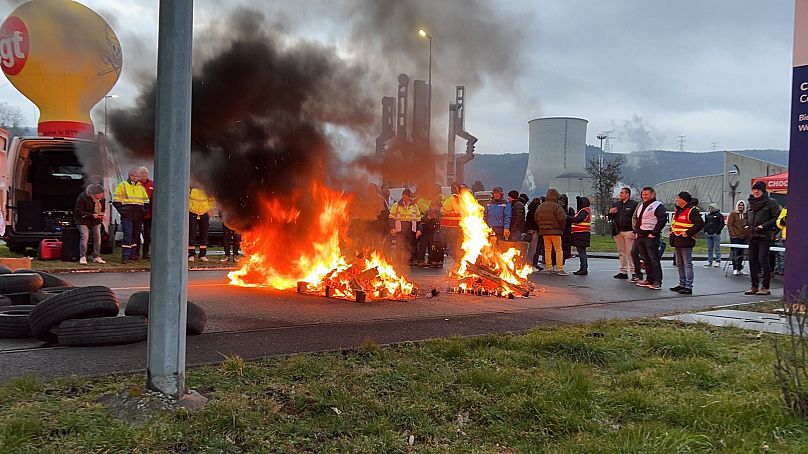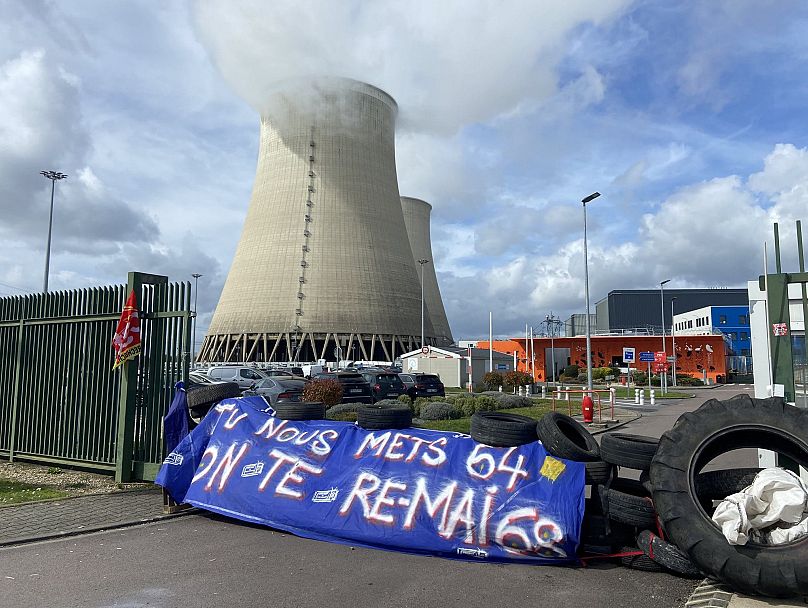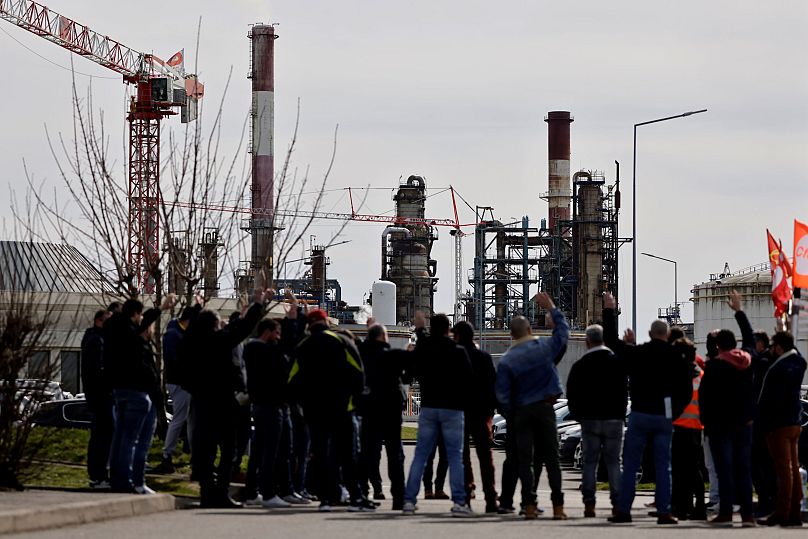In "a beautiful image" amid the power struggle, French electricians are cutting power to the rich and giving it to the poor.
The production and distribution of energy are critical to the functioning of society.
 ADVERTISEMENT
ADVERTISEMENT
 ADVERTISEMENT
ADVERTISEMENT
This means that striking energy workers can exercise a lot of leverage and put pressure on governments or their employers to negotiate, particularly if they are willing to resort to spikier, more creative tactics.
French workers are currently doing just that in the ongoing dispute over pension reform which is entering its fourth month. Industrial action is heating up as a result of the government’s decision to raise the pension age as planned without a vote in parliament.
Energy workers - from the operators of nuclear plants, to electricians maintaining the grid and employees at oil refineries - have been on the frontlines of some of the most combative aspects of the dispute.
They have been deploying militant tactics against the government, with the government playing hardball in return.
Nuclear workers going on strike
France’s electricity mix is dominated by nuclear power. According to the latest International Energy Agency review, nuclear accounts for around 71 per cent of the nation’s electricity production. Hydroelectric power contributes 10 per cent, while a mix of thermal and other sources make up the rest.
This means that when the workers in France’s nuclear power stations go on strike they can have a significant impact on the nation’s economy by cutting the production of electricity.
In the energy sector, workers have to give a 48 hour warning before striking so that critical infrastructure can be maintained.
Fabrice Coudour, Federal Secretary of the CGT union for Mines and Energy, says that workers “have mastered the tools of their work” so are deciding to call their strikes ahead of times that cause maximum disruption to the process of running a power station.
According to an EDF spokesperson, RTE, the body responsible for balancing energy supply and demand, needs to import electricity if production falls too low. Coudour explains this is one of the principal ways that workers in nuclear power stations can exercise leverage.
He says that the striking workers have “a strong economic impact. But that’s the goal of the strike, to put pressure on the economy. Because the main investor in EDF is the state, the strikers press economically on the business to make the state react”.
EDF and the CGT told newspaper La Tribune that on 3 March, the strike had an effect equivalent to shutting off five nuclear plants. RTE says that since the strikes began, it has observed cuts in production at several plants. But if the production gets low enough as to endanger energy security the operator will use its power to order some workers back to work.
The average amount of electricity that France uses per day is approximately 129.5 million megawatt hours.
EDF estimates that on 28 March there was a drop in production of 12,410 MW. The CGT estimates that each strike day lowers production by between 15,000 and 20,000 MW.
‘Robin Hood’ electricians
Electricity and gas workers currently have a “special regime” where their pension deal takes into account the harshness of their work. The reform will remove this deal, so engineers at EDF have adopted radical tactics that extend beyond the strike.
As well as withdrawing their labour, workers at EDF have been performing clandestine stunts known as ‘Robin Hood actions’ where they cut electricity to the rich and powerful and supply it for free to the poor.
These actions demonstrate very literally who holds power in the economy and they have been used against MPs and even the president.
On 15 March, power was cut to the Fort de Bregançon, the official residence of the president, by striking workers in the Côte d'Azur branch of the CGT. Coudour says that particular action was “symbolic and it was a beautiful image, having Robin Hood act in this way”.
In February, Cyrille Isaac-Sibille, a centrist MP aligned to the president found that the power had been cut to his office by the local CGT branch in Lyon. Other actions have included cutting the power to the Stade de France.
In order to keep public opinion on side, workers also perform “positive” actions. This is done by secretly tampering with or removing smart meters from apartment buildings, schools and hospitals so their usage is undercounted.
In an interview with Mediapart, Renaud Henry of Marseille’s CGT Energy branch estimated that they have removed smart meters from the buildings of 60,000 Marseille residents meaning there is no way of cutting them off if they cannot pay.
An estimate from the radio station RMC on 23 March found that the strike and Robin Hood actions had cost EDF €440 million since the beginning of January.
French oil blockades
EDF is not the only part of the energy sector where workers are downing tools. Workers in oil refineries owned by Total and Exxonmobil are also taking part in the “rolling strike”. On 7 March, the CGT stated that every oil refinery in France was blocked so that oil could not leave the premises.
While it was only one day that saw every refinery blockaded, many remain so with ongoing strikes and pickets. This has led to fuel shortages at pumps across France with the Energy Ministry estimating that on 23 March, 15 per cent of petrol stations were missing at least one product.
Alexis Antonioli, Secretary General of the CGT in Gonfreville in northern France, says that each day of the strike in oil depots and refineries results in a loss of between 4 and 5 million euros for the affected companies.
Because of this, the government has issued “requisition orders” to certain refineries which makes it illegal for workers not to do their jobs.
Fabien Cros, a representative of the CGT and a trainer of workers at Total Energy near Marseille said that because it is not just the refineries, but also the depots and the ports that are striking, it will be hard for the government’s requisition orders to work.
Recently an order was given to the Fos Sur Mer refinery near Marseille which resulted in a conflict with the police. Cros says that “they sent the CRS, they sent 200 policemen, a truck, a water cannon. The only thing we can do if they have given the requisition order is to prevent them from entering the site by creating blockades. That’s what we also did in Normandy two days ago”.
Fuel shortages at airports
Requisition orders have also been given to refineries and depots in Normandy and Gonfreville which supply kerosene to airports in Paris.
Antonioli says “the requisition orders are only a temporary obstacle that we are trying to remove. In any case, once they have emptied our stock there will no longer be any production at our site.
“They used this unpopular measure because they are in enormous difficulty at Paris airports”.
According to BFMTV and AFP, the situation has become “critical” for the Roissy and Orly airports in Paris and the stocks at Charles de Gaulle are under strain. The government has said they are making “targeted interventions” to try and resolve the situation.
Airport workers are also striking and between their strike and the fuel shortages, an estimated 30 per cent of flights at Orly were cancelled last weekend.
As one commentator on Twitter put it, the “strike might achieve the environmental movement's decades long goal” of closing down airports.
Total did not respond to a request for comment.













